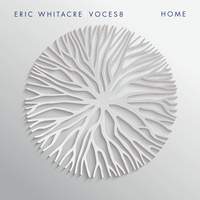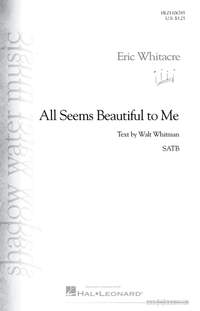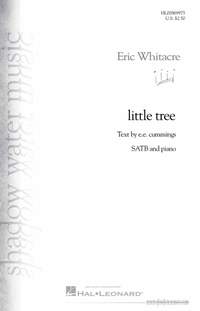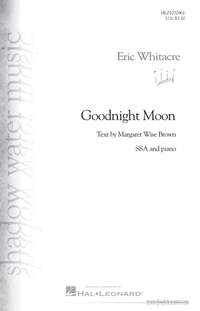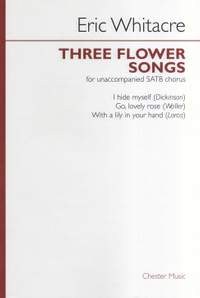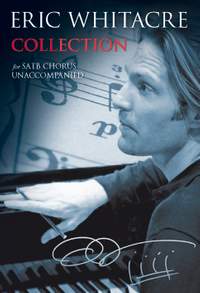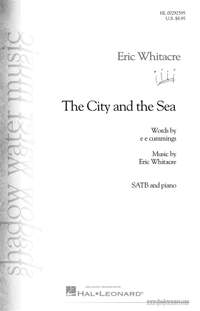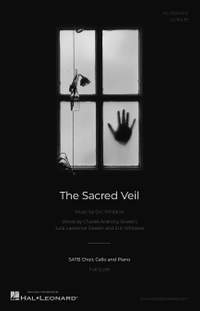Interview,
Eric Whitacre at... 30!
 The music of Eric Whitacre could reasonably be termed a cultural phenomenon - wildly successful around the world, instantly harmonically recognisable, and accessible to a wide range of performers and audiences. But while some composers seem to have been set on clear trajectories relatively early, Whitacre's first meeting with the world of choral music seems to have come about almost by chance.
The music of Eric Whitacre could reasonably be termed a cultural phenomenon - wildly successful around the world, instantly harmonically recognisable, and accessible to a wide range of performers and audiences. But while some composers seem to have been set on clear trajectories relatively early, Whitacre's first meeting with the world of choral music seems to have come about almost by chance.
As he explained in a Zoom call recently looking back over the three decades since his first composition, if things had happened only a little differently he might never have encountered the idiom which for most people defines him as a composer, and which Whitacre himself prizes as uniquely special.
It’s thirty years since your first ever work, Go, Lovely Rose. What was the context of this piece’s composition?
Well, I came to classical music late; I didn't start till my teens. I didn't read music. I'd never been in choir. And this man David Weiller, who was the choir conductor at the university I went to in Las Vegas, convinced me to join the group.
So you weren't studying music?
Not really! That's what I thought I was going to do, but they didn't accept me as a music major at first. So I was just freely floating and didn't know what I was going to study.
But David heard me audition for a music scholarship (which I also didn't get!) and he heard me play piano, and suggested that I come and sing. So I did, and this man just utterly changed my life by introducing me to choral music. He had this tradition that at the end of every year, he would perform a different setting of that poem Go, Lovely Rose. At the time I think there were maybe five or six of them, and the most famous is probably the one by the American composer Halsey Stevens. That's the piece that we sang the year before I wrote my setting of it. I thought I would write him his own setting, as a gift, so he would have something he could take with him.
Eric Whitacre's Go, Lovely Rose, performed by Voces8 on the newly-released album Home
You broke through into many people’s awareness with the phenomenally successful Light & Gold in 2010. What was different about that, that made you suddenly become a household name?
It's the old joke, right? It only took me twenty years to become an overnight success! It was a combination of so many things. Much earlier than that, back in 2000-1, there was a file-sharing program called Limewire, and I had a whole bunch of bootleg recordings of pieces I had written, that were being shared around a lot - and I could watch that activity online and see that it was starting to take off!
So there was a lot of buzz, and I started pretty early in social media, and that started to generate interest as well. And I think it was in about 2005-6 that Stephen Layton and Polyphony released an album called Cloudburst, and that album was a big explosion. My music was being performed a lot in the US by this point, but man, that album really made a difference. It was picked up by some international news media outlets, and I feel like that was the start of the real public thing.
It wasn't so much coming out of nowhere - for me, Light & Gold was more of a capstone. That same year, I did a TED Talk and worked on Pirates of the Caribbean with Hans Zimmer, and it felt like everything was happening. Like Hemingway said about going bankrupt - it happens very slowly and then very fast.
As a collection of choral works, Light & Gold is actually fairly representative of the majority of your music. What is it about the choral genre that particularly attracts you?
I love it, I adore it. It's a combination of things. First and foremost, I've always been a big reader; my grandmother was a librarian, and she used to give me books of poetry when I was young as five or six. So I grew up thinking that was a normal thing. And the combination of words and music, to me, is intoxicating. It creates a whole-brain experience for me, and lights up my mind like nothing else.
Then there's this colour palette that you have with choirs in general. To me, the only thing that comes close is a string quartet, where there's just endless variation in colours with the vowels and the way the mouth is shaped; with the breathing, with the dynamics. And like the strings it's the only other completely homogenous sound from top to bottom.
So you'd choose those groups as sources of colour, rather than the kaleidoscope of sounds that the symphony orchestra offers?
Yes. Part of it is that I was lucky enough to be introduced to what I suppose you'd call "art song" choral music; there was this thing happening in the US especially with this composer named Morten Lauridsen, writing these new madrigals, and they weren't at all sacred - it wasn't that kind of sound that you might get from Renaissance choral music or even stuff that was being written in the '50s or '60s - it was so word-driven, it was poetry-driven. It was storytelling, like you would with art songs. So then for me, the colours that you could get, if you could just be painting these words so delicately and intimately, I find much more subtle than orchestral writing.
And then finally, something much bigger - there's something about the sound, and not even the sound but simply the aesthetic, of voices massed together. Human beings coming together with only their bodies to create this music. Breathing at the same time, that sort of thing. It's intoxicating, and I'm going to chase that dragon for the rest of my life.
As you enter your fourth decade of composing, how would you say your approach and style have changed since Go, Lovely Rose?
In a very general way, I think (or I'd like to think!) that I've become more efficient with the musical material that I use. I think that's true - I'm thinking back over some of my compositions now! - that I'm better now at not "over-writing", if you will.
Doing more with less?
Yes, I think so. And then I've also become much, much more formal in the way that I compose. Early on I would say pieces were basically throughcomposed, or if I was lucky they were sort of song forms where there's a kind of a refrain that starts and ends the piece, that sort of thing. Go, Lovely Rose is a perfect example - the same basic idea recurs a couple of times and a tiny little tone-poem sort of unfolds.
Now, though, I'm hyper-formal, I find - I spend a lot of time making drawings and schematics before I write a note of music, and I think a lot about the form and the way things are going to evolve, and then use the same material over and over. I have to laugh, really - it's taken me thirty years to get to where Bach was when he was fourteen, just taking a tiny bit of musical material and then using that as the thread that combines everything.
Starting from this place you describe, of being so word-driven, it's presumably very easy to just be led by the words rather than setting down some independent structure.
That's right, yes. But then later on I realised that even poetry that is pure prose has deep structure, and with enough reflection a very clear structure appears that is much more than simply starting at the top and unfolding. Also - I haven't thought about this very much, but I think it might be true - I suspect I'm drawn more to poems that have that kind of deep structure than I am to poetry that tends to just unfold. Go, Lovely Rose is extremely structured, right? It's very, very formal. Four stanzas, very clear.
Am I imagining it, or have you moved a little towards writing bigger pieces over time? Thinking of things like your recent work The Sacred Veil...
I think I have, and I think it's related to that thinking about structure. The other one that really comes to mind is a big piece for orchestra and chorus called Deep Field. The Sacred Veil is an hour long and in twelve movements, but they're all cut from the same cloth with the same motifs and themes. Ideas and structural things.
And is that something that "past you" wouldn't really have considered doing?
Just the other day I was thinking about this: Is it because I'm older, I've got more experience, I'm pushing myself? Maybe all of those things.
But then I had to smile because I thought "actually, it's probably because when I wrote Deep Field, my son had turned ten." Anybody who has kids knows that the first five years are just insanity, and then the next five have you trying to find your feet. At ten, they're little people, and you kind of have your headspace back. So I think that's what happened. And most recently, with The Sacred Veil, it was written in this little window of time when my son was a teenager, and I didn't have any "kids" in a way (I've now got a two-year-old). So I had lots and lots of time and headspace to think big.
I marvel at composers like Mahler who were able to have a family and somehow write massive pieces.
So now that you've got another small child, the pieces are going to get smaller again for the next eight or nine years?
I hope not! But it's so hard to find not only the headspace but also weeks and weeks of incredibly focused, concentrated thought, you know? I could see myself writing smaller pieces.
Arguably your most popular work is The Seal Lullaby - what is it about this piece that you think has connected with so many people?
Oh no! I honestly can't solve this riddle. I smile every time I see this piece; occasionally I'll hear a pop or rock artist expressing their surprise about the same sort of thing: "This one's the hit!? OK..." I never could have guessed. I knew it was a sweet little tune when I wrote it (for a film that ended up never being made), and then turned it into a choral piece that I thought choirs might enjoy doing.
I think it's probably a pragmatic thing; it's one of the very few pieces of mine that's in only four parts for the choir, and the ranges are all very conservative, and the piano part is playable, and so I imagine a big part of it is that a large part of the fanbase are just people who have sung it themselves.
But it seems also to have this life on radio and people doing covers of it in all kinds of other ensembles.
I really don't know what it is. Not to get too mystical about it, but it might just be the right combination of notes somehow? You know how sometimes there's a combination of harmony and melody that really gets under your skin. And the fact that people think it's effective in all these different combinations, and keep playing it.
Eric Whitacre's Seal Lullaby, performed by The Eric Whitacre Singers
Are there other things like that whose reception by the public has surprised you?
Yes, sometimes. I wrote a song-cycle called The City and the Sea, with five pieces just using the white keys on the piano. They're all e e cummings poems in a variety of moods, and I loved doing them. I say this in all humility of course, but viewed from 35,000 feet I think these are some of the best-written things I've done. And they never get performed, and I mean never. No-one knows they exist! And I'm always surprised by that. It's just funny - sometimes when you're working on something you think "I think this will really work" and then it just doesn't catch fire somehow.
Your upcoming album features the world premiere recording of a new work, All Seems Beautiful to Me. Without giving too much away, what can you tell us about this piece?
Where to even begin? Like most of my choral music, it starts and ends with the text. I've wanted to set Walt Whitman for ever, and I've never found a way in. There are certain poets for whom it's like they just don't need me, if you know what I mean? The poetry sings and hums on the page or when it's being spoken.
There's something very musical about some of Whitman's writing in particular...
Yes - those long, long phrases, and it's sometimes difficult to figure out your way into it.
During the pandemic I was asked by the United States Air Force Band and Choir, of all people, to write a piece for when we emerged from the pandemic. And at the time, like many people, I was essentially in the foetal position wondering whether there would ever be music again and what I, and all of us, were doing. It was very isolating. And I went to the Leaves of Grass collection, which I've read I don't know many times, and just opened it and turned to No.5, Song of the Open Road, and I just realised that it was everything I would hope for a society to be, coming through this and coming out of it. It's amazing to think that he wrote it in the nineteenth century and it's so liberal-minded, so compassionate, and so deeply human. And at the same time it's not preachy, it's lusty and alive - it's just uniquely Whitman.
So I sat down and tried to figure out: how do I set this, how does it become a piece? And it took me a long time to find the musical structure in there, but I think I finally cracked it to my own satisfaction. The deep structure is somewhat different from the words on the page, and this recurring refrain "all seems beautiful to me" seemed important, in terms of the way humanity is unfolding.
Eric Whitacre's All Seems Beautiful to Me, performed by Voces8
Voces8, Eric Whitacre
Available Formats: CD, MP3, FLAC, Hi-Res FLAC
SATB a cappella
Available Format: Sheet Music
More Eric Whitacre
Commission by Vance George of the San Francisco Symphony Chorus, and dedicated to Eric's little sister, this piece features text by E.E. Cummings.
Available Format: Sheet Music
Originally composed for harp, string orchestra and solo soprano, next adapted for soprano and piano and now finally available for choir and piano. This SA setting takes a whimsical approach to the text we as parents have read hundreds of times. The harmonic structure is transparent and the choral writing is smart and a joy to sing.
Available Format: Sheet Music
Written early in Whitacre's career whilst at the University of Nevada in Las Vegas. Arranged for SATB choir, includes a piano line for rehearsal purposes. Contents include I hide myself, With a lily, and Go, lovely Rose.
Available Format: Sheet Music
This a cappella collection of pieces for mixed choir by Eric Whitacre includes pieces of varying difficulty, wide-ranging in theme, from the iconic Sleep and Water Night to the quietly angelic Lux Aurumque (Light and Gold).
Available Format: Sheet Music
Assembling five songs previously published separately and all with texts by E.E. Cummings, this set is a real bargain. Originating as a Chorus America commissioning project, the sum is greater than its parts.
Available Format: Sheet Music
Written with poet Charles Anthony Silvestri, this twelve-movement work chronicles the rich life of Tony and his late wife Julie Silvestri.
Available Format: Sheet Music
You can find more Eric Whitacre sheet music here.


